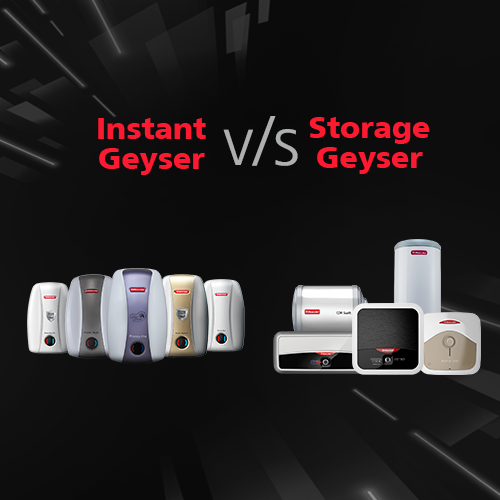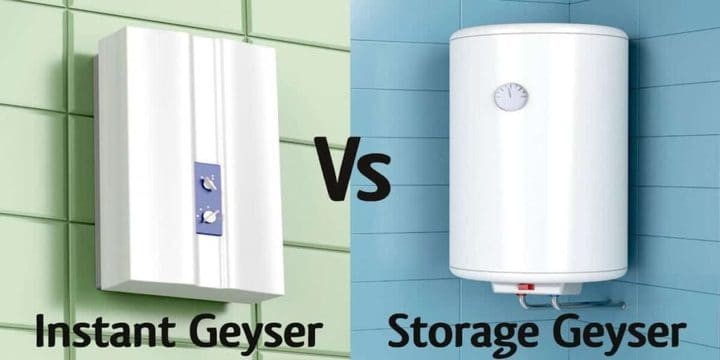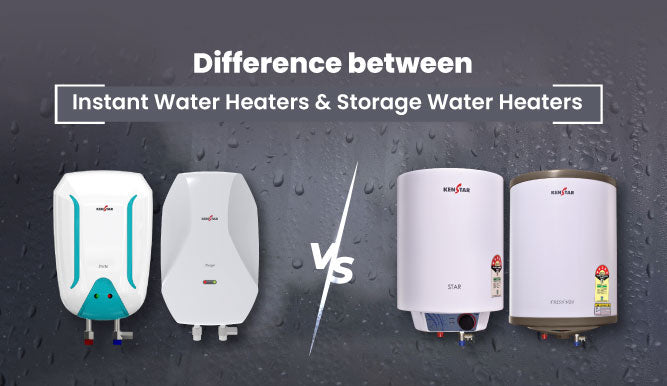A heater warms up a space, while a geyser heats water for bathing and household use. Both serve different purposes.
Heaters and geysers play crucial roles in our daily lives, especially during colder months. Heaters provide warmth to rooms and living spaces, ensuring comfort and coziness. They come in various types, including electric, gas, and oil-based heaters. Geysers, on the other hand, are specifically designed to heat water.
They are essential for providing hot water for showers, baths, and other household needs. Geysers can be electric, gas, or solar-powered. Understanding the distinction between these two appliances helps in choosing the right one based on your needs and ensures efficient energy usage.
Basic Definitions
Understanding the difference between a heater and a geyser can be confusing. Both are used for heating, but they serve different purposes. Let’s explore their basic definitions to clarify how they work.
Heater
A heater is a device that generates heat. Heaters can warm up rooms, water, or other objects. They come in various types, such as:
- Electric heaters
- Gas heaters
- Oil heaters
Heaters are often used in homes and offices to keep the environment warm. They convert energy into heat through different methods. Some heaters use electricity, while others burn fuel.
Geyser
A geyser is a specific type of water heater. It heats water for bathing, washing, or cooking. Geysers are common in many households. They come in two main types:
- Instant geysers
- Storage geysers
Instant geysers heat water quickly as it flows through. Storage geysers heat and store a certain amount of water. Geysers usually use electricity or gas as their energy source.
| Feature | Heater | Geyser |
|---|---|---|
| Primary Use | Heating rooms and spaces | Heating water |
| Energy Source | Electricity, Gas, Oil | Electricity, Gas |
| Types | Electric, Gas, Oil | Instant, Storage |
Functionality
Understanding the functionality of heaters and geysers helps in making an informed choice. Both serve the purpose of providing warmth but operate differently. Let’s explore how each device works.
How Heaters Work
Heaters generate warmth through various energy sources. These sources include electricity, gas, or oil. Here’s a quick look at their working mechanisms:
- Electric Heaters: Use electrical resistance to produce heat.
- Gas Heaters: Burn natural gas or propane to generate warmth.
- Oil Heaters: Heat oil within the unit, which radiates warmth.
Heaters are designed to warm up rooms or enclosed spaces. They have thermostats to control the temperature. Some are portable, while others are fixed installations.
How Geysers Work
Geysers, also known as water heaters, specifically heat water. They are essential for hot showers and baths. Here’s how they operate:
- Electric Geysers: Use heating elements to warm water stored in a tank.
- Gas Geysers: Burn gas to heat water instantly or in a tank.
- Solar Geysers: Use solar panels to heat water with sunlight.
Geysers ensure a constant supply of hot water. They come with thermostats to set the desired water temperature. Some models offer instant heating, while others store hot water.
Types
Understanding the different types of heaters and geysers can help you choose the right one for your home. Each type offers unique benefits and serves different purposes. Let’s dive into the various types available for both heaters and geysers.
Types Of Heaters
Heaters come in several varieties, each designed for specific needs and spaces. Below are the most common types:
- Electric Heaters: These use electrical energy to produce heat. They’re easy to install and maintain.
- Gas Heaters: These use natural gas or propane. They’re efficient and cost-effective.
- Oil-Filled Heaters: These use oil as a heat reservoir. They’re quiet and provide steady warmth.
- Ceramic Heaters: These use ceramic plates to generate heat. They’re quick to warm up and safe to use.
- Infrared Heaters: These use infrared technology to emit heat. They are energy-efficient and silent.
Types Of Geysers
Geysers also come in various types, each tailored for different requirements. Here are the main types:
- Electric Geysers: These use electricity to heat water. They are easy to install and provide instant hot water.
- Gas Geysers: These use natural gas or LPG. They are efficient and heat water quickly.
- Solar Geysers: These use solar energy. They are environmentally friendly and reduce electricity bills.
- Instant Geysers: These provide hot water on demand. They are compact and ideal for small spaces.
- Storage Geysers: These store hot water in a tank. They are suitable for large families.
Each type of heater and geyser has its own set of advantages. Choosing the right type depends on your specific needs and preferences.

Credit: www.youtube.com
Energy Sources
Understanding the energy sources of heaters and geysers is crucial. This knowledge helps make informed decisions about home heating solutions. Let’s explore how heaters and geysers are powered.
Powering Heaters
Heaters come in various types. Each type uses different energy sources. Here are some common ones:
- Electricity: Most space heaters use electricity. They convert electrical energy into heat.
- Gas: Some heaters use natural gas or propane. Gas heaters are efficient for large spaces.
- Oil: Oil-filled radiators are another type. They use electricity to heat the oil inside.
- Wood: Wood-burning stoves are traditional heaters. They use logs or wood pellets.
Powering Geysers
Geysers, also known as water heaters, have different energy sources. Here are the most common ones:
- Electricity: Electric geysers are popular in homes. They heat water using electric elements.
- Gas: Gas geysers use natural gas or propane. They are quick and energy-efficient.
- Solar: Solar geysers use energy from the sun. They are eco-friendly and reduce electricity bills.
- Heat Pump: These geysers use heat from the air or ground. They are highly efficient and save energy.
Here is a table summarizing the energy sources for heaters and geysers:
| Device | Energy Source | Efficiency |
|---|---|---|
| Electric Heater | Electricity | High |
| Gas Heater | Natural Gas/Propane | High |
| Oil Heater | Electricity | Medium |
| Wood Heater | Wood | Low |
| Electric Geyser | Electricity | High |
| Gas Geyser | Natural Gas/Propane | High |
| Solar Geyser | Solar Energy | Very High |
| Heat Pump Geyser | Air/Ground Heat | Very High |
Applications
Heaters and geysers serve different purposes. They are designed for specific applications in homes and businesses. Understanding their common uses can help you choose the right one for your needs.
Common Uses Of Heaters
Heaters are versatile devices. They are used in various settings to provide warmth.
- Space Heating: Heaters are often used to warm up rooms.
- Emergency Heating: They can be handy during power outages.
- Outdoor Use: Patio heaters keep outdoor spaces warm.
- Industrial Use: Heaters are used in factories to maintain temperature.
Common Uses Of Geysers
Geysers are specialized for heating water. They are commonly used in homes and businesses.
- Domestic Hot Water: Geysers provide hot water for showers and baths.
- Kitchen Use: They supply hot water for cleaning and cooking.
- Commercial Use: Geysers are used in hotels for guest services.
- Industrial Applications: They provide hot water for processes and cleaning.

Credit: www.racold.com
Efficiency And Cost
Understanding the efficiency and cost of heaters and geysers is crucial. Both devices serve the purpose of heating, but their operational costs and energy efficiency differ. Let’s delve into these aspects.
Energy Efficiency
Energy efficiency is about how well a device converts energy into heat.
- Heaters: Heaters typically use electricity or gas. Electric heaters are usually less efficient due to energy loss. Gas heaters, while more efficient, can be costly.
- Geysers: Geysers often use electricity or solar power. Electric geysers are efficient but consume a lot of electricity. Solar geysers are highly efficient and eco-friendly.
| Device | Energy Source | Efficiency |
|---|---|---|
| Electric Heater | Electricity | Medium |
| Gas Heater | Gas | High |
| Electric Geyser | Electricity | Medium to High |
| Solar Geyser | Solar | Very High |
Cost Considerations
Understanding the cost of installation and operation is vital.
- Heaters:
- Initial Cost: Heaters are generally cheaper to install. Electric heaters are more affordable than gas heaters.
- Running Cost: Running an electric heater can be costly due to electricity usage. Gas heaters have a lower running cost but require gas supply.
- Geysers:
- Initial Cost: Geysers, especially solar ones, have a higher installation cost. Electric geysers are more affordable initially.
- Running Cost: Electric geysers can increase electricity bills significantly. Solar geysers, although expensive initially, have minimal running costs.
In summary, heaters and geysers have distinct differences in efficiency and cost. Consider your energy source and budget when choosing. This ensures optimal performance and cost-effectiveness.
Safety Concerns
Safety is vital for both heaters and geysers. Both devices heat water but have different safety features. Understanding these features helps prevent accidents and ensures safe use.
Safety Features In Heaters
Heaters come with multiple safety features. Here are the most common ones:
- Overheat Protection: This feature turns off the heater if it gets too hot.
- Tip-Over Switch: This switch turns off the heater if it falls.
- Cool-Touch Exterior: The outer surface remains cool to the touch.
- Auto Shut-off: The heater shuts off after a set time to prevent overheating.
Safety Features In Geysers
Geysers also include various safety features. Key features include:
- Thermostat Control: This feature controls the water temperature to prevent overheating.
- Pressure Release Valve: It releases excess pressure to avoid explosions.
- Auto Cut-off: The geyser cuts off power when the desired temperature is reached.
- Dry Heat Protection: This feature prevents the geyser from operating without water.

Credit: www.linkedin.com
Choosing The Right Device
Choosing between a heater and a geyser can be confusing. Both devices serve to provide warmth, but their functions differ. Understanding your needs helps in making the right choice.
Factors To Consider
Several factors influence the choice between a heater and a geyser. Let’s break them down:
| Criteria | Heater | Geyser |
|---|---|---|
| Primary Function | Heats rooms | Heats water |
| Installation | Easy to install | Requires professional installation |
| Energy Consumption | Moderate to high | Varies by type |
| Cost | Less expensive | More expensive |
Personal And Environmental Needs
Consider your specific needs to make an informed decision:
- Climate: Choose a heater for cold climates; a geyser for hot water needs.
- Space: Heaters are compact; geysers need more space and plumbing.
- Usage: Heaters for living areas; geysers for bathrooms and kitchens.
Evaluate these factors before deciding. Both devices have unique benefits. Choose based on your personal and environmental needs.
Frequently Asked Questions
What Is A Heater Used For?
A heater is used to warm up indoor spaces. It’s commonly used in homes, offices, and other buildings. Heaters work by converting electrical energy into heat. They are essential for maintaining a comfortable temperature during cold weather.
What Is A Geyser Used For?
A geyser is used to heat water for various purposes. It’s typically installed in bathrooms and kitchens. Geysers provide hot water for bathing, cooking, and cleaning. They are crucial for daily household activities.
How Do Heaters And Geysers Differ?
Heaters and geysers serve different purposes. Heaters warm up air in a room, while geysers heat water. Heaters are used in living spaces; geysers are used in bathrooms and kitchens. Both are essential for comfort and convenience.
Which Is More Energy-efficient, Heater Or Geyser?
Energy efficiency varies by model and usage. Heaters usually consume more energy for prolonged use. Geysers can be more efficient if used properly. Choosing energy-efficient models and using them wisely can save energy.
Conclusion
Understanding the difference between a heater and a geyser helps you make informed choices for your home. Heaters provide general warmth, while geysers specifically heat water. Choose based on your needs to optimize energy use and comfort. For more home improvement tips, explore our other blog posts.

